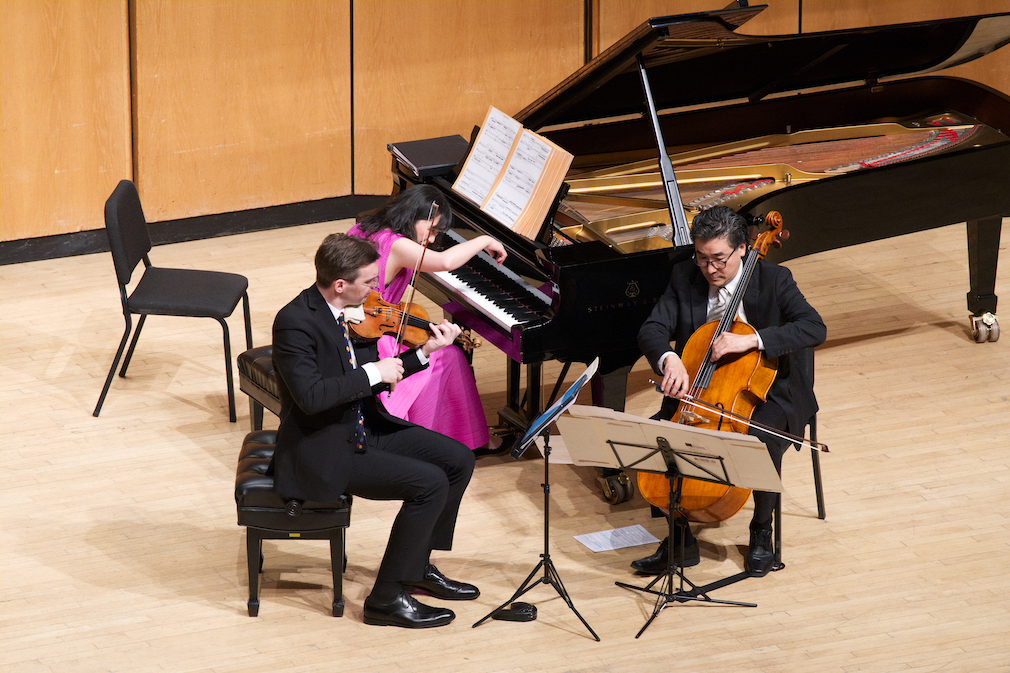Horszowski Trio brings virtuosity and finesse to Winter Chamber Festival

The Northwestern Winter Chamber Music Festival kicked off its final weekend with the series debut of the excellent Horszowski Trio at Pick-Staiger Concert Hall on Friday night. The New York-based trio — the ensemble in residence at the Longy School of Music — delivered a master class of effortless elegance and consistency in a program framed by a pair of 19th-century piano trios.
The first, Bedřich Smetana’s Trio in G Minor, was composed in response to the death of the composer’s beloved eldest daughter. On its face, the piece is a fraught expression of grief marked by knotted, sinuous themes and jagged rhythms. But those thornier elements quickly give way to more introspective undercurrents that are the tender heart of the work.
Rather than play too heavily into either affect, the Horszowski Trio took a middle-of-the-road interpretation, softening the gnarled moments and filtering the sentimental ones in a technically stunning if somewhat anodyne reading. Leading off at a surprising clip, given the Moderato assai tempo marking, the trio brought a sense of fluidity to the movement that downplayed the bounciness of the 6/8 meter.
The middle movement, often played as a bristling scherzo, took on a lopsided, off-kilter gait on account of a quasi-rubato tempo throughout the folkish opening theme. The ensemble nevertheless cohered marvelously in pacing and dynamics alike. In one particularly soaring passage in the second alternativo, Ole Akahoshi’s buttery cello melded seamlessly with Jesse Mills’s plush violin tone.
Pianist Reiko Aizawa provided tireless rhythmic locomotion throughout the roiling Presto. The musicians were at their most revelatory as the restive finale melted into a hymnic reverie. Aizawa’s plainspoken chords conjured a portrait of childlike innocence, but as the strings joined to deliver the major-key interpolation of the first theme, that image blossomed into a poignantly sober statement of acceptance.
The Horszowskis’ blend of expressive nuance and restrained pathos proved a stylistic match for Robert Schumann’s Piano Trio No. 1 in D Minor, in the program’s latter half. The dark-hued first movement, “Mit Energie und Leidenschaft,” is a spiritual sibling to the opening of the Smetana trio. The stakes aren’t so high in this music, though, so the Horszowskis’ supple and unforced approach illuminated Schumann’s graceful melodies and ensured continuity throughout the work’s elided phrase endings and unexpected harmonic detours.
And yet, the first movement’s most captivating moment arrives with a tonal shift — from warm lyricism into a crystalline sheen in which violin and cello shiver on the melody sul ponticello while the piano murmurs soft-pedaled chords beneath.
The interior movements, though technically precise, were on the tepid side. At the outset of “Langsam, mit inniger Empfindung,” Aizawa’s matter-of-fact piano chords seemed a perfunctory accompaniment to the breathlessness of Mills’s wistful violin solo. The players deftly sustained tension as the third movement slipped into the fourth in a thrilling culmination of the program. As the ensemble neared the movement’s end, they extended the accelerando well past the composer’s marked directive, bringing some previously unforeseen heat to the work’s resonant conclusion.
At the center of Friday’s program were short works assembled under the title of Fantasiestücke Project. Commissioned to commemorate the Horszowski Trio’s tenth anniversary in 2021, the three pieces, each by a different American composer, pay homage to the influence of Schumann and his fantasias.
The first, Remembrance, by genre-spanning composer and clarinetist Derek Bermel, opens with a simple, descending motif. Though initially diatonic, each successive restatement of the theme cascades into a different harmonic realm — by turns reminiscent of Gershwin, Debussy and Hindemith — before returning to the unadorned major-key capo.
By contrast, David Fulmer’s Eldorado explores a microcosm within a limited range of timbres by exploiting the orchestration of that turnkey moment in Schumann’s First Trio when, in the first movement, strings and piano turn suddenly ethereal and glassy. Though the two works otherwise have little in common aesthetically, the Horszowskis illuminated Fulmer’s Schumannesque proclivity for subverting expected arrivals.
The last installment, Paul Chihara’s Fantasy “Little Red Dragonfly,” nods both to the composer’s Japanese heritage — the piece’s theme is based on the popular Japanese tune “Aka Tombo” by composer Kosaku Yamada — and to Schumann, whose Introduction and Concert Allegro for Piano and Orchestra, Op. 134, is often attributed as the provenance of the Japanese tune’s melody.
The Horszowskis supplied ample verve and rich color to the Fantasy’s cinematic palette, which spanned pizzicato grooves and bouts of unalloyed romanticism. Clearly, the ensemble had no trouble extending its expressive eloquence to the music of their simpatico contemporaries. A noteworthy feat, indeed.
The Northwestern Winter Chamber Music Festival concludes Sunday afternoon with the Jupiter Quartet performing music by Mozart, Florence Price, William Bolcom and Brahms. music.northwestern.edu
Posted in Uncategorized

